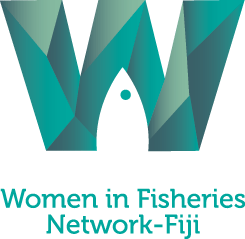Gender and Fisheries workshops were held in the provinces of Tailevu and Ba over 3 days. This was followed by a photo voice workshop on the fourth day with the same participants.
The key objectives of the Gender and Fisheries workshops were to:
- Create awareness and build knowledge on gender issues in the women in fisheries sector
- Build an understanding of the current policies and legislation pertaining to protecting and empowering women in Fiji and
- Provide an appreciation of gender roles of men and women working as partners in the community, working as agents of change supporting sustainable sources of livelihood and alleviating poverty.
Tailevu Workshop
Twenty eight participants from the Tailevu districts of Bau, Buretu and Sawakasa attended the three-day workshop on gender and fisheries in Korovou. The training workshop was rated as successful by participants who reported increased understanding on gender issues in their lives and community.
The differences between gender and sex were understood by participants who easily related the concepts to their own socialisation process. Participants understood that gender roles of men and women are inter-changeable as men and women assist each other in their respective roles. Gender issues were easily identified by the men, women, young men and young women. Some male participants demonstrated courage and accountability in acknowledging that they do fall short of their gender roles.
Participants had the opportunity to use a gender analytical framework and selected participatory tools in analysing case studies. They also applied their learning to their own communities and their fishing activities. Group work, presentation and team work principles were emphasized throughout the training.
The usage of time use analysis tool revealed that men especially fathers spent substantial time at kava sessions with their peers. They spend less quality time with their children. Thus, mentoring of children and instilling good values into them was discussed in great depth, as something yet to be desired.
Time was allocated where participants could share their problems; identify their causes, effects, solutions and possible partners who could assist in implementing the solutions.
The key problems identified include:
- Unfavourable weather conditions
- No boat and mismanagement of existing boats
- Lack of awareness on value added processes and market outlets
- Loss of traditional knowledge and skills on fishing methods
- Cutting down of mangroves
- Pollution of fishing grounds by rubbish (plastic bags, diapers, pig waste, etc).
- Shark attack especially at high tide whilst harvesting seaweed
- Community members‟ susceptibility to bites from sea creatures bites and stings.
Ba Workshop
A total of twenty-nine participants attended the Ba workshop in Lautoka. 66% and 34% were females and males respectively. They came from the five districts of Ba, Bulu, Nailaga, Tavua, Vitogo and Vuda.
Gender issues were easily drawn out by participants in their role plays and analysis of case studies. The usage of gender framework analytical and participatory tools was useful as participants apply the tools effectively. Findings from case studies and their own communities caused in depth discussion and realisation of lessons learned. Such findings from each district are true representations of actual activities that occur in villages.
More than 80% of participants rated the training workshop as effective in its deliverance. Participants interacted freely and were quite vocal in some of the discussions.
Having a gender sensitised male as a co-facilitator enhanced the learning of participants. However, some genuine gender issues were identified that were discussed to great lengths.
One of the contributing factors to the success of the workshop was the participation of the Ministry of Fisheries representative in the last two days of the workshop. The Senior Fisheries Officer responded to all questions concerning fisheries and its activities in the West. Similarly, a representative from the Ministry of i-Taukei actively participated and responded to all queries pertaining to the previous and drafted Village Act or Lawa Vakoro and other relating issues.
